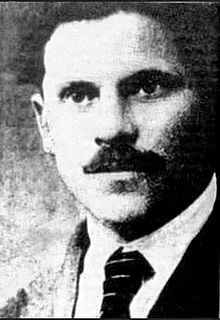Sholom Schwartzbard
| Sholom Schwartzbard | |
|---|---|
 |
|
| Native name | Самуил Исаакович Шварцбурд Samuil Isaakovich Shvartsburd |
| Born |
Shalom-Shmuel Schwarzbard August 18, 1886 Izmail, Bessarabia Governorate, Russian Empire |
| Died | March 3, 1938 (aged 51) Cape Town, South Africa |
| Other names | Samuel (Sholem) Schwarzbard |
| Citizenship | Russian Empire, France |
| Organization | anarchist |
| Known for | Schwartzbard trial |
| Spouse(s) | Anna Render |
| Parent(s) | Isaak Shvrtsburd Khaye Veisberger |
| Military career | |
| Allegiance |
|
| Service/branch | Army |
| Years of service | 1914–1919 |
| Unit |
French Foreign Legion 363rd Infantry Regiment (France) Petrograd Red Guards Cavalry group of Tiraspol squad International brigade |
| Battles/wars |
World War I Second Battle of Artois Battle of the Somme Russian Civil War |
| Awards | Croix de guerre (1917) |
Shalom-Shmuel Schwarzbard (Russian: Самуил Исаакович Шварцбурд, Samuil Isaakovich Shvartsburd, Yiddish: שלום-שמואל שװאַרצבאָרד, French: Samuel (Sholem) Schwarzbard; 18 August 1886 – 3 March 1938) was a Russian-born French Yiddish poet of Jewish descent. He served in the French and Soviet military, was an anarchist, and is known for the assassination of the Ukrainian national leader Symon Petliura. He wrote poetry in Yiddish under the pen name of Baal-Khaloymes (English: The Dreamer).
Schwarzbard was born in 1886 in Izmail, Bessarabia Governorate, Russian Empire to the Jewish family of Itskhok Shvartsbard and Khaye Vaysberger. His real given name was Sholem. After the proclamation of an order by the Russian Imperial government for all Jews to move out from the region within 50 versts (33 mi) of the border, his family moved to the town of Balta which is in the southern Podolia region where he grew up. His three older brothers died as children and his mother died whilst he was a child. In 1900, at an early age of 14 he became an apprentice to a watchmaker, Israel Dik.
During his apprenticeship in 1903, he became interested in Socialism and began moonlighting as a revolutionary agitator for a group called "Iskra" – probably because of ties to Lenin's journal of the same name. At the time of the first Russian Revolution in 1905, he was based in Kruti, 30 miles north of Balta, where he was employed, in his own words, "fixing Cossack watches". A short time after participating in Jewish self-defense while visiting his father in Balta, he was arrested and served a short stint in Proskurov and Balta prisons. He was released with the general amnesty granted as part of post-revolutionary tsarist "leniency". Fearing further arrests, Schwartzbard stole across the border into Austria-Hungary, where he lived and worked in a number of cities and towns, including the capital, Vienna, and Budapest. There, he was converted to anarchism, a political philosophy, especially the teachings of Peter Kropotkin, to which he would remain loyal the rest of his life.
...
Wikipedia
